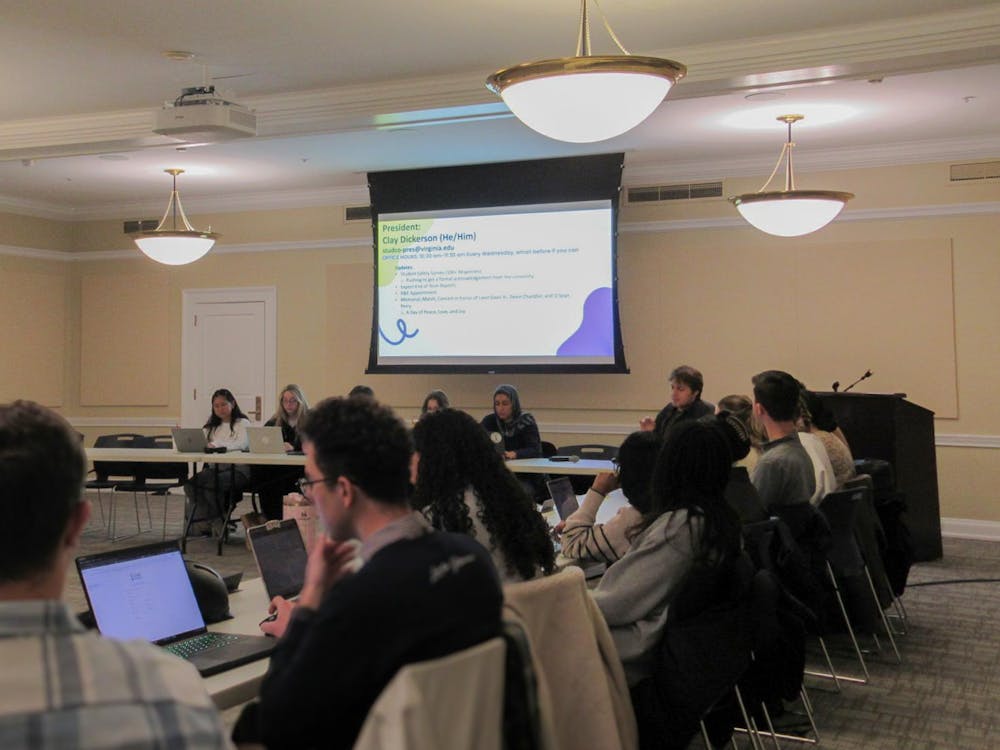The Student Council met Tuesday to discuss a potential proposal for a student detoxification center on Grounds following growing concerns about student safety and medical amnesty policies. Representatives also reviewed results from a survey distributed after last week’s lockdown and received updates on new wellness initiatives, including free Plan B offered through Student Health and Wellness. Members also finalized preparations for Thursday’s memorial honoring the three students killed in the 2022 University shooting.
Clay Dickerson, Student Council president and fourth-year College student, reminded members that Thursday marks three years since the 2022 shooting that claimed the lives of Lavel Davis Jr., Devin Chandler and D’Sean Perry. In remembrance, the University community held a memorial concert Wednesday from 6 to 8 p.m. at the Vinegar Hill Theatre. Student Council is also co-sponsoring a vigil from 6 to 8 p.m. on the South Lawn Nov. 13. Dickerson reflected on the legacy of the three victims and asked members to honor them.
“Two years ago … Student Council passed a proclamation serving a Day [every Nov. 13] of Peace, Love and Joy … Those were the words that came out to describe each of [the victims] individually, … and in their own respects represented who they were to their communities,” Dickerson said. “Keep those three qualities in mind as we go about our business, to honor and respect them.”
In addition to honoring those lost, Dickerson reflected on the University’s response to last week’s lockdown, which followed a false active shooter report. Dickerson said Student Council’s student safety survey — released immediately after the lockdown — received over 100 student responses, collecting feedback on communication and preparedness during emergencies. He said that the University community is looking for a response from the administration.
“A lot of folks [want] the University to acknowledge what happened [or] at least discuss how they are reacting and moving on from it beyond the initial response from President Mahoney,” Dickerson said. “I, alongside others, [feel] we are pushing to get formal acknowledgement and discussion going in response.”
Lily Dorathy, Student Council director of coalition engagement and fourth-year Batten and College student, added that she will bring these student concerns directly to administrators at a meeting Wednesday, in which she will speak with Timothy Longo, associate vice president for safety and security and chief of police, about improvements to emergency procedures and communication issues.
Later in the meeting, fourth-year College representative David Dzul presented a comprehensive report on the feasibility of establishing an on-Grounds detoxification center — a facility that would serve as an alternative to hospitalization or policy custody for intoxicated students deemed medically stable by Emergency Medical Services.
Dzul said that he had several meetings with Student Legal Services, Student Health and Wellness and Substance Use and Recovery officials. These meetings explored whether such a center could qualify as a court-approved detoxification center under Virginia’s medical amnesty laws.
He explained that under Virginia’s medical amnesty laws, police officers can take intoxicated individuals to a court-approved detox center instead of jail, but the site must be open to the public. According to Student Legal Services, if it is solely maintained through Student Affairs for specifically University students, the center will not be approved by a judge, and students could still be subject to arrest.
Dzul said a primary reason for a detoxification center is that many students are unaware that ambulance rides and hospital transports are completely free to University students, leading some to refuse EMS assistance when intoxicated or in distress. He said that this lack of information puts students at risk and contributes to unnecessary arrests for public intoxication when police are called instead.
“A huge reason why students refuse to go and get EMS attention … [is] because they just don’t know that the ER is an available location for them,” Dzul said.
Council members discussed whether establishing this University-run detoxification center — in lieu of immediately seeking hospital care — would address the problem or potentially encourage excessive drinking and strain EMS resources if the services are overused. Dzul said additional research is needed to determine how often students are arrested for public intoxication and how officers apply medical amnesty laws. The student detoxification center remains under discussion.
Saehee Pérez, Student Council chief of cabinet and third-year College student, also announced that the free Plan-B pilot program — which will provide students with this emergency contraception at no cost — is awaiting final pharmacy approval before its launch. Once approved, it will make emergency contraception accessible through the Student Health and Wellness pharmacy.
Student Council members also unanimously approved a budget amendment renaming the Accommodations Access Fund to the Cavalier Health Fund, aligning its name with the organization’s current wellness programs. This change did not alter funding amounts but ensured that internal budgeting language reflects the updated structure of the Support and Access Services.
Shifting from wellness, Pérez also said that all five Cavalier Education course applications submitted this semester were approved by College advising dean Mark Hadley. This Cavalier Education initiative funds student-led for-credit courses where students can design and teach one- or two-credit classes. The courses will soon appear in the Student Information System and are scheduled for the upcoming term.
Student Council will reconvene Tuesday at 6:30 p.m. for a regularly scheduled general body meeting.







